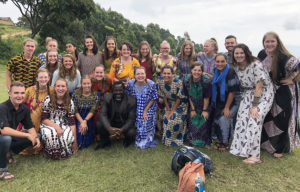What does it mean to “use your heartbeats well”? This was the question posed to a group of Houghton Students as they sat under a thatch roof, watching the vervet monkeys play in the trees, on a cloudless morning. Though they sat in front of a stereotypical chalkboard, with their pens and papers before them, this was anything but a normal spring semester.
For the past 17 years, Houghton (and other partnering colleges) have been sending groups of 20-25 students to Masumbo- a rural campus just outside of the city of Iringa, Tanzania- to study development, anthropology and biology in an intercultural and hands-on setting. It is a program focused on experiential learning, in which everything that is learned in the classroom is immediately applied in an authentic context. For example, students would learn about the flora and fauna of an ecosystem in the classroom, and then go experience the land for themselves on safari – or debate sustainable development strategies, and then visit the places in which these strategies are being carried out.
The climax of the trip was a homestay, during which students were sent out to live with Tanzanian villagers for eight days; working when they worked, eating what they ate, and worshiping where they worshiped. It was a culminating experience, which challenged students to join their classroom knowledge of culture, history and language with the everyday experience of rural Tanzanians. “Homestay is one of the things that blares in my mind when I think about Africa… it helped me begin to learn some of the cultural nuances and some of the things that you can’t really see on the surface” said senior Alana Meyers. In addition to homestay, students got to engage with East African culture by visiting the Maasai people, watching Wahehe dancers, experiencing Tanzanian cuisine at places like the iconic “Hasty Tasty”, playing lots of football (soccer) and enjoying the landscape that sustains such an abundance of life.
 When not out exploring, students called the Masumbo campus home. It’s a spacious field shaded by huge umbrella acacia trees and complete with an open air picnic hut, the “Twiga”-where students had class, and tiny “bandas” (huts) where students lived in pairs. The Ruaha river flows close by and students spent their afternoons lounging by the rapids or soaring over the river on the zipline. Senior Maggie Clune offered this vivid description: “My place had turned into a muddy brown river with rocks lining the paths. It had Bandas running along the treeline and a giant thatch roof classroom with couches perfect for napping. My place was suddenly a little hut, filled with art, that monkeys jumped on the roof of to wake me up in the morning. It was where chipates [an African version of a tortilla] quickly turned into a campus favorite and our professors became our best friends. I had my home, I had Houghton, and now I had Tanzania…… Masumbo created a safe place for me to sit and think about but what the future will hold for me. It gave quietness and peace to work through the changes that would be made when I got home.”
When not out exploring, students called the Masumbo campus home. It’s a spacious field shaded by huge umbrella acacia trees and complete with an open air picnic hut, the “Twiga”-where students had class, and tiny “bandas” (huts) where students lived in pairs. The Ruaha river flows close by and students spent their afternoons lounging by the rapids or soaring over the river on the zipline. Senior Maggie Clune offered this vivid description: “My place had turned into a muddy brown river with rocks lining the paths. It had Bandas running along the treeline and a giant thatch roof classroom with couches perfect for napping. My place was suddenly a little hut, filled with art, that monkeys jumped on the roof of to wake me up in the morning. It was where chipates [an African version of a tortilla] quickly turned into a campus favorite and our professors became our best friends. I had my home, I had Houghton, and now I had Tanzania…… Masumbo created a safe place for me to sit and think about but what the future will hold for me. It gave quietness and peace to work through the changes that would be made when I got home.”
The semester in Tanzania program is designed to grow students in more than just an academic sense. Students attended chapels focusing the connection between God, ourselves, and the earth and wrestled with what it means to experience life together in a small close-knit community. In the words of Hannah Sievers, the semester “immensely altered my view of people, nature and God.”
